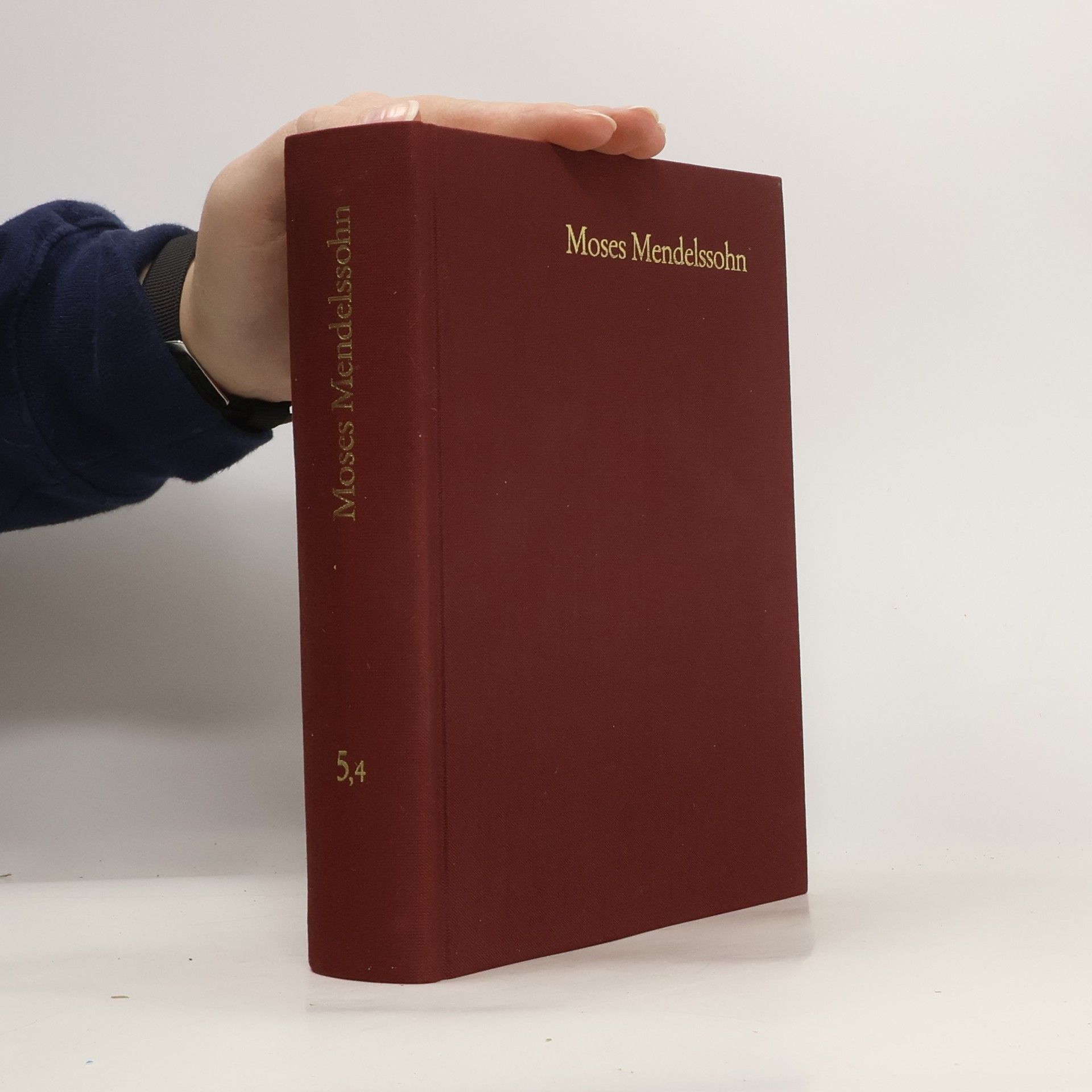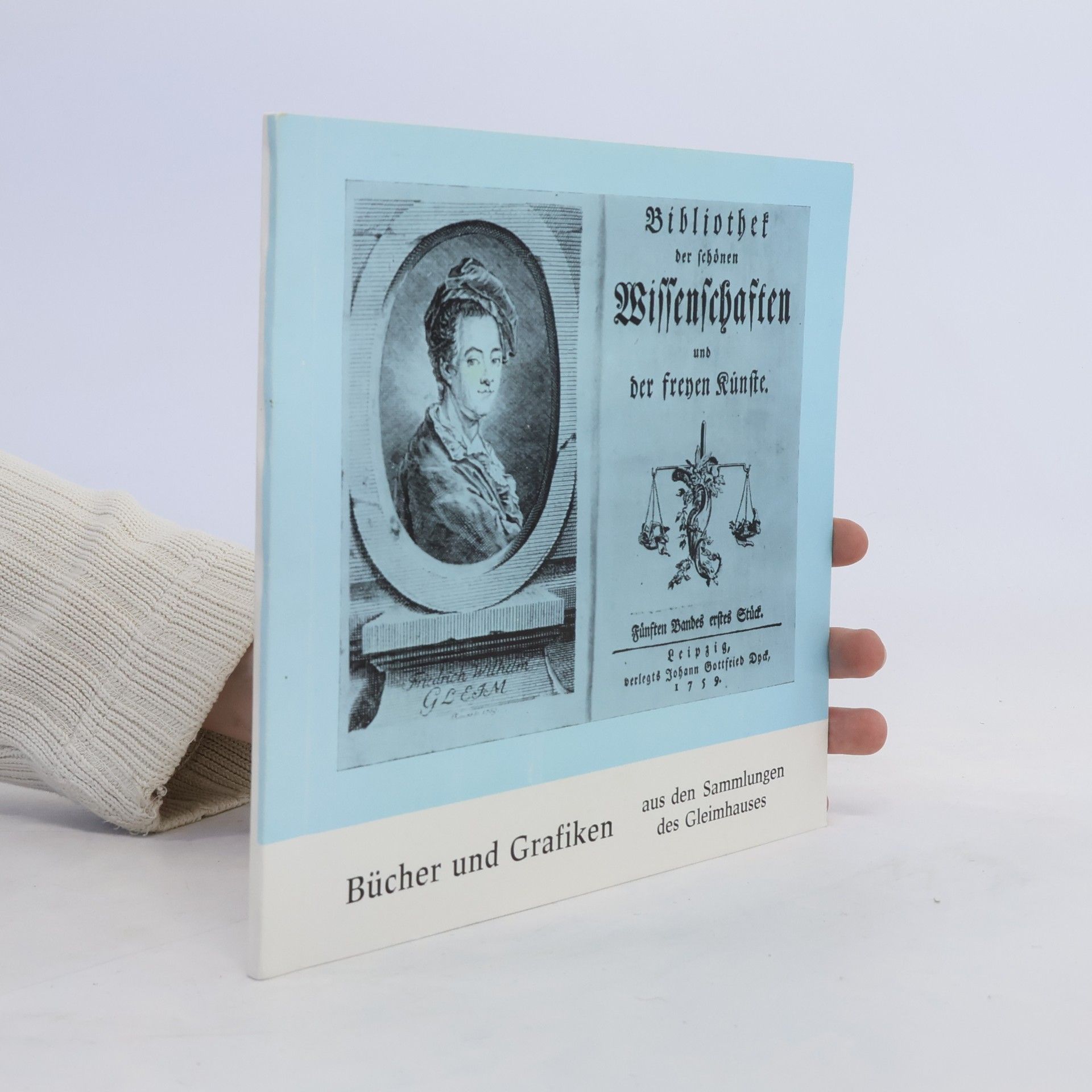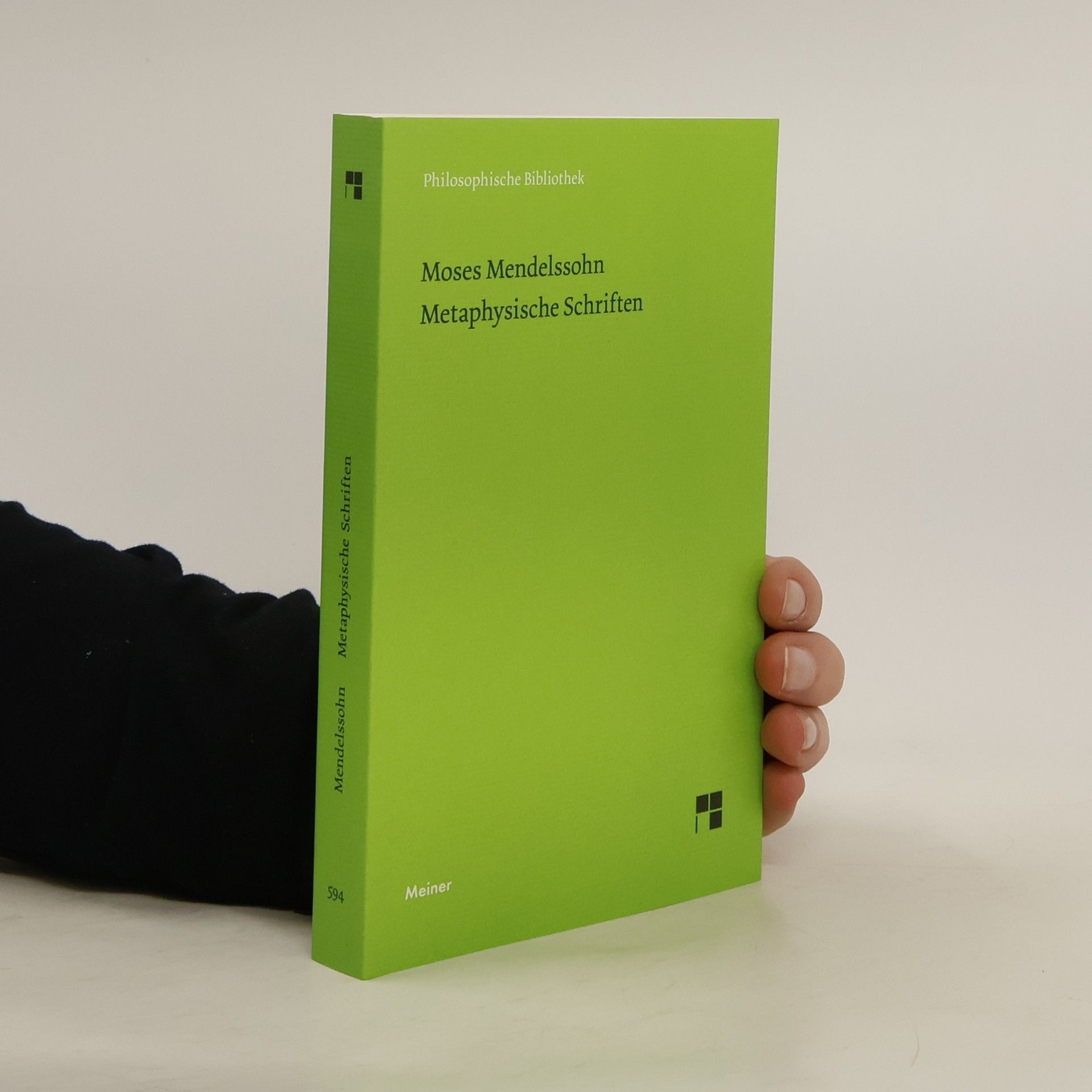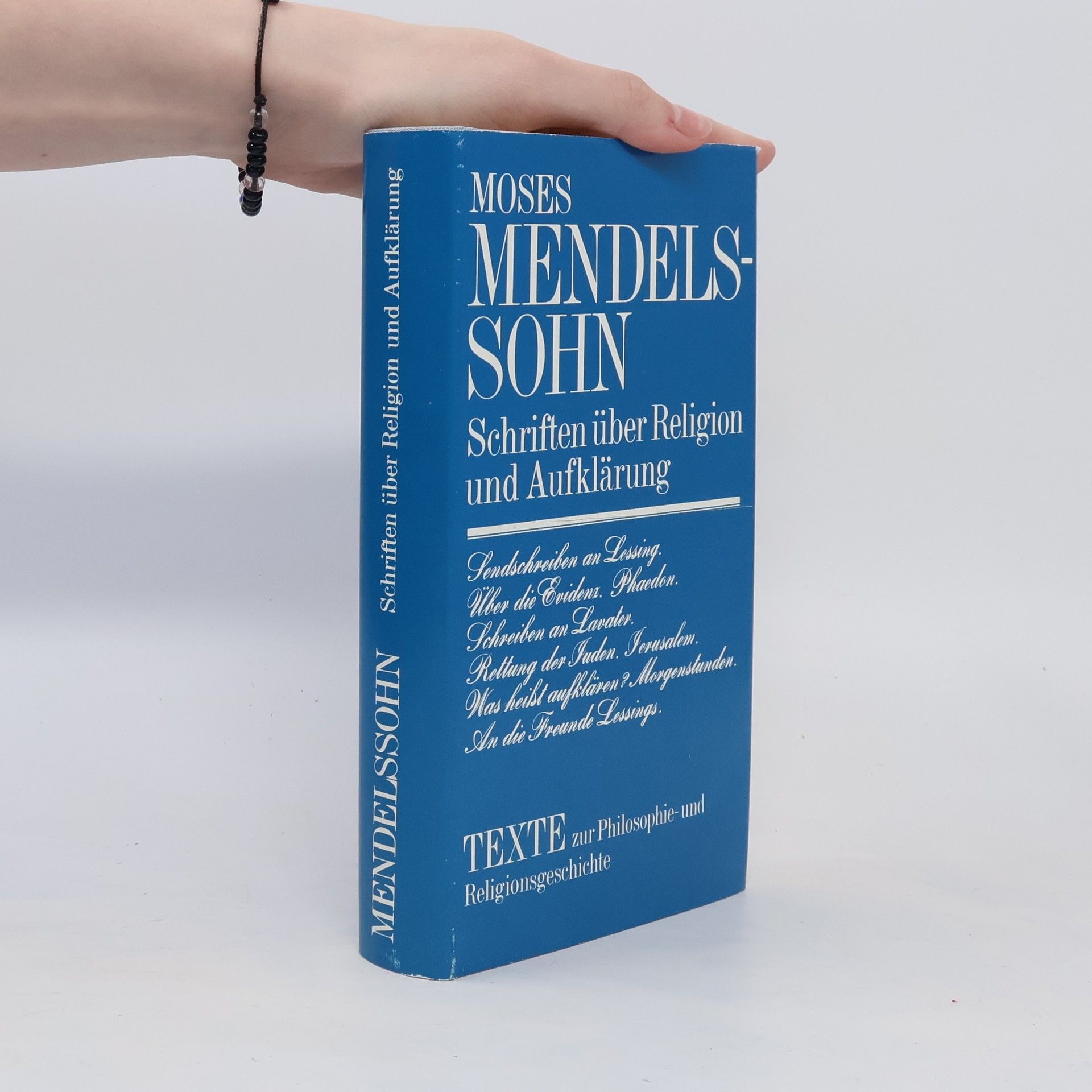"Moses Mendelssohn: Phaedon oder über die Unsterblichkeit der Seele" bietet in drei Gesprächen tiefgehende Überlegungen zur Unsterblichkeit der Seele. Die 2023er Berliner Ausgabe enthält einen durchgesehenen Neusatz sowie eine Biografie des Autors, bearbeitet von Theodor Borken. Ein bedeutendes Werk der Aufklärung.
Moses Mendelssohn Book order (chronological)
Moses Mendelssohn was a German Jewish philosopher whose ideas indebted the Haskalah, the Jewish enlightenment of the eighteenth and nineteenth centuries. Though a practicing orthodox Jew himself, he has been referred to as the father of Reform Judaism. Through his writings on philosophy and religion, he became regarded as a leading cultural figure of his time by both Germans and Jews. His thought influenced not only religious movements but also the German Enlightenment as a whole.






Moses Mendelssohn (1729-1786) war ein deutscher Aufklärungsphilosoph und Wegbereiter der Haskala. 1767 veröffentlichte er "Phädon oder über die Unsterblichkeit der Seele", eine moderne Interpretation des platonischen Dialogs. Zudem präsentierte er eine Biographie über Sokrates, die ihn als "deutschen Sokrates" bezeichnete.
Moses Mendelssohn: Gesammelte Schriften. Jubiläumsausgabe / Band 21,1-2: Nachträge
- 560 pages
- 20 hours of reading
Der Band präsentiert unveröffentlichte philosophische Fragmente und Judaica von Mendelssohn sowie Korrespondenzen mit bedeutenden Zeitgenossen. Er beleuchtet unter anderem Mendelssohns Ansichten zu Kants Konzepten von Zeit und Raum, diskutiert "ewige Wahrheiten" und enthält Gedichte aus dem Siebenjährigen Krieg. Zudem finden sich Anmerkungen zu Michaelis' Rezension von Dohms Werk zur bürgerlichen Verbesserung der Juden. Die Briefe stammen von und an prominente Persönlichkeiten wie Lessing, Friedrich II. und Lavater, was einen einzigartigen Einblick in die intellektuelle Landschaft dieser Epoche bietet.
Phädon: Oder, über die Unsterblichkeit der Seele, in erey Gesprächen. Vierte Auflage
- 296 pages
- 11 hours of reading
Bei diesem Werk handelt es sich um eine urheberrechtsfreie Ausgabe. Der Kauf dieser Kindle-Edition beinhaltet die kostenlose, drahtlose Lieferung auf Ihren Kindle oder Ihre Kindle-Apps.
Die Tora nach der Übersetzung von Moses Mendelssohn und die Haftarot
- 702 pages
- 25 hours of reading
Moses Mendelssohn (1729-1786) schuf die erste jüdische Übersetzung der Tora ins Hochdeutsche. Diese Übersetzung zeichnet sich durch ihre besondere sprachliche Schönheit aus. Sie wurde für das 21. Jh. für den synagogalen Gebrauch lexikalisch und grammatikalisch revidiert und unter jüdisch-liturgischen Gesichtspunkten gestaltet: die synagogalen Wochenabschnitte, die traditionelle jüdische Abschnitteinteilung und besondere Schreibtraditionen des Textes werden angegeben. Diese Ausgabe enthält sowohl die orthodoxen als auch die liberalen Prophetenlesungen (Haftarot) und Ausschnitte der Festrollen (Megillot), die Gebete zur Toralesung, ein Glossar und die Markierung der 613 Gebote nach Maimonides.
Die Tora nach der Übersetzung von Moses Mendelssohn
und die Haftarot angelehnt an die Übersetzungen von Simon Bernfeld, Joel Brill, A. Benesch, Schlomo Salman Lipman, Wolff Meir und Josef Weiss
Moses Mendelssohn (1729-1786) schuf die erste jüdische Übersetzung der Tora ins Hochdeutsche. Diese Übersetzung zeichnet sich durch ihre besondere sprachliche Schönheit aus. Sie wurde für das 21. Jh. für den synagogalen Gebrauch lexikalisch und grammatikalisch revidiert und unter jüdisch-liturgischen Gesichtspunkten gestaltet: die synagogalen Wochenabschnitte, die traditionelle jüdische Abschnitteinteilung und besondere Schreibtraditionen des Textes werden angegeben. Diese Ausgabe enthält sowohl die orthodoxen als auch die liberalen Prophetenlesungen (Haftarot) und Ausschnitte der Festrollen (Megillot), die Gebete zur Toralesung, ein Glossar und die Markierung der 613 Gebote nach Maimonides.
"Schriften zur Philosophie, Ästhetik und Apologetik" ist ein hochwertiger Nachdruck der Originalausgabe von 1880. Herausgegeben von Hansebooks, konzentriert sich das Werk auf den Erhalt historischer Literatur und bietet Einblicke in das Leben und die Gedanken Mendelssohns.
Moses Mendelssohn zählt zu den bedeutendsten Denkern der deutschen Aufklärungsphilosophie. Seine 1763 prämierte Abhandlung über die Evidenz in Metaphysischen Wissenschaften war vor Kants Beitrag der erste bedeutende Text zu diesem Thema. Die Morgenstunden oder Vorlesungen über das Dasein Gottes, als Vermächtnis des 'Sokrates von Berlin', markierten den Beginn des Pantheismusstreits, einer der zentralen Debatten des 18. Jahrhunderts. Mendelssohn argumentiert, dass metaphysische Beweise zu Unrecht in Verruf geraten sind, da die Prüfung ihrer Gültigkeit zeigt, dass der Mensch trotz begrenzter Erkenntnis das Dasein Gottes erkennen kann. Der Streit um Gott entsteht weniger aus der logischen Struktur der Beweise als aus der psychologischen Komplexität des Themas. Daher muss der Philosoph seine Argumentation so klar wie möglich gestalten und die Erkenntnismöglichkeiten des gesunden Menschenverstandes einbeziehen. Metaphysik kann nur dann allgemein anerkannt werden, wenn sie logische Strenge mit verständlicher Darstellung vereint. Diese neue Ausgabe der metaphysischen Schriften Mendelssohns, die die Evidenz-Abhandlung, die Morgenstunden und die frühe Schrift Gedanken von der Wahrscheinlichkeit umfasst, zeigt die Eigenständigkeit seines Denkens. Der Herausgeber erläutert, dass gängige Etiketten wie Eklektizismus oder Rationalismus Mendelssohns Philosophie nicht gerecht werden.
Moses Mendelssohn: Gesammelte Schriften. Jubiläumsausgabe / Band 5,4: Kommentar zu Band 5,2
- 506 pages
- 18 hours of reading
Der Band untersucht 37 multidisziplinäre Rezensionen aus Nicolais 'Allgemeiner deutscher Bibliothek' und bietet umfassende Kommentare sowie Anmerkungen. Dabei wird die Vorgeschichte der Originaltexte beleuchtet, einschließlich Themen wie die Historizität der 'Ilias', die Gelehrtenrepublik Klopstocks und die Herausforderungen des Übersetzens. Zudem behandelt er literarische Fragmente, die sich mit Shaftesbury und Herder auseinandersetzen, und zeigt Mendelssohns Interesse an Synonymen sowie sein Epigramm über Fanny von Arnstein. Ein facettenreicher Einblick in die Literatur und Philosophie des 18. Jahrhunderts.

